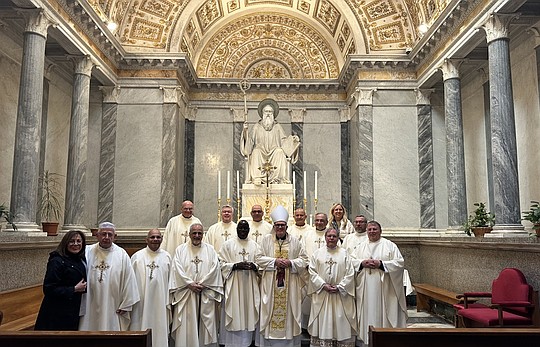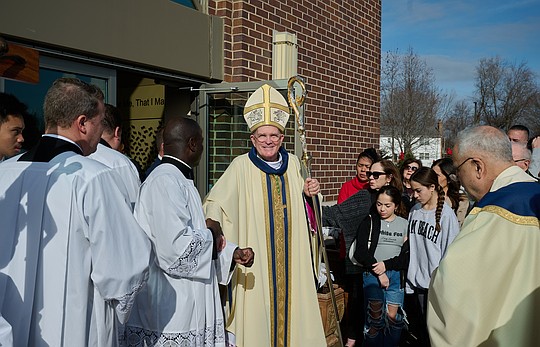French-trained chef turned Catholic priest raises funds, builds community with Memphis king cakes
February 19, 2023 at 9:02 p.m.

As this Lent approaches, Father Bradshaw sacrifices some sleep and heads over to the kitchen at St. Michael Church in Memphis, where he is pastor, before daybreak.
In the wee hours of the morning, he prepares to make hundreds of king cakes in time for Mardi Gras, the Tuesday before Ash Wednesday. Before anyone else shows up, he puts on his apron, his hat and makes large quantities of frosting, dough, and sweet and savory specialty fillings, as he prays in the still hours of dawn.
Before becoming a priest, Father Bradshaw was a chef, trained in France. Now he shares that gift with his Church. "We will make close to 700 cakes," he said in a recent interview, with frosting stuck to his elbows. For a week, he rarely stops, and neither do his helpers.
The 20 volunteers squeeze, roll and decorate king cakes each day. They have a very orderly system and workflow. Some roll out the dough in the kitchen, perfectly piping in rich fillings of cream, caramel or cherries. They fold all of that together and then swing it into shape – just right – before placing it onto a baking sheet and bringing it together forming a circle.
The king cakes are baked, cooled and then brought into another room where another crew is waiting to ice them.
Mixers filled with brightly colored green, purple and yellow icing sit in the corner of the room, and volunteers drizzle the icing onto the cakes. Colorful little baby figurines are hidden inside, and then Mardi Gras bead necklaces are carefully placed over the top of the frosting.
The cakes are boxed and then set aside on tables all up and down the hallway of the Church office.
[[In-content Ad]]
King cakes are a tradition of Mardi Gras. According to folklore around this tradition, whoever finds the baby figurine in the cake will be lucky and prosperous. That person must also bring a king cake to the Mardi Gras party next year.
Looking out from underneath his large knit slouchy beanie, Father Bradshaw was eager to share his knowledge. He invited a visitor to the kitchen, asking, "Would you like to make one?"
Father Bradshaw said he loves the experience, which is fun for him, and he enjoys the challenge and discipline of pastry.
"What makes a good pastry chef is being attentive to technique," he said. "For the French, technique is everything. You must be militant about the mixing of ingredients and mix them in a way that works. Otherwise, it won't work."
The money raised from the sale of king cakes will go directly to fund the many ministries at St. Michael Church. From "Souls for Service," a ministry for children and adults with special needs, to "Burnt Offerings," cigars and conversation for men of the Church, the parish offers a little something for everyone.
The once-waning parish, in an older, diverse neighborhood in central Memphis, is experiencing a resurgence. The parish has grown to about 5,000 families. Each weekend there are seven Masses, including four in Spanish.
Related Stories
Friday, January 02, 2026
E-Editions
Events
As this Lent approaches, Father Bradshaw sacrifices some sleep and heads over to the kitchen at St. Michael Church in Memphis, where he is pastor, before daybreak.
In the wee hours of the morning, he prepares to make hundreds of king cakes in time for Mardi Gras, the Tuesday before Ash Wednesday. Before anyone else shows up, he puts on his apron, his hat and makes large quantities of frosting, dough, and sweet and savory specialty fillings, as he prays in the still hours of dawn.
Before becoming a priest, Father Bradshaw was a chef, trained in France. Now he shares that gift with his Church. "We will make close to 700 cakes," he said in a recent interview, with frosting stuck to his elbows. For a week, he rarely stops, and neither do his helpers.
The 20 volunteers squeeze, roll and decorate king cakes each day. They have a very orderly system and workflow. Some roll out the dough in the kitchen, perfectly piping in rich fillings of cream, caramel or cherries. They fold all of that together and then swing it into shape – just right – before placing it onto a baking sheet and bringing it together forming a circle.
The king cakes are baked, cooled and then brought into another room where another crew is waiting to ice them.
Mixers filled with brightly colored green, purple and yellow icing sit in the corner of the room, and volunteers drizzle the icing onto the cakes. Colorful little baby figurines are hidden inside, and then Mardi Gras bead necklaces are carefully placed over the top of the frosting.
The cakes are boxed and then set aside on tables all up and down the hallway of the Church office.
[[In-content Ad]]
King cakes are a tradition of Mardi Gras. According to folklore around this tradition, whoever finds the baby figurine in the cake will be lucky and prosperous. That person must also bring a king cake to the Mardi Gras party next year.
Looking out from underneath his large knit slouchy beanie, Father Bradshaw was eager to share his knowledge. He invited a visitor to the kitchen, asking, "Would you like to make one?"
Father Bradshaw said he loves the experience, which is fun for him, and he enjoys the challenge and discipline of pastry.
"What makes a good pastry chef is being attentive to technique," he said. "For the French, technique is everything. You must be militant about the mixing of ingredients and mix them in a way that works. Otherwise, it won't work."
The money raised from the sale of king cakes will go directly to fund the many ministries at St. Michael Church. From "Souls for Service," a ministry for children and adults with special needs, to "Burnt Offerings," cigars and conversation for men of the Church, the parish offers a little something for everyone.
The once-waning parish, in an older, diverse neighborhood in central Memphis, is experiencing a resurgence. The parish has grown to about 5,000 families. Each weekend there are seven Masses, including four in Spanish.










